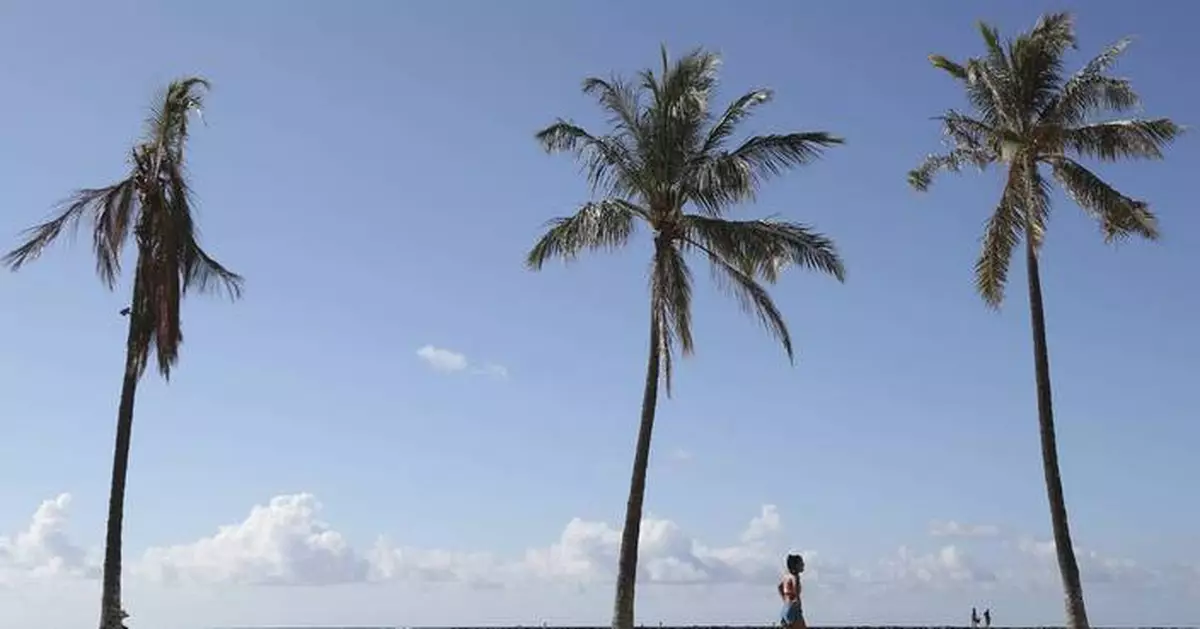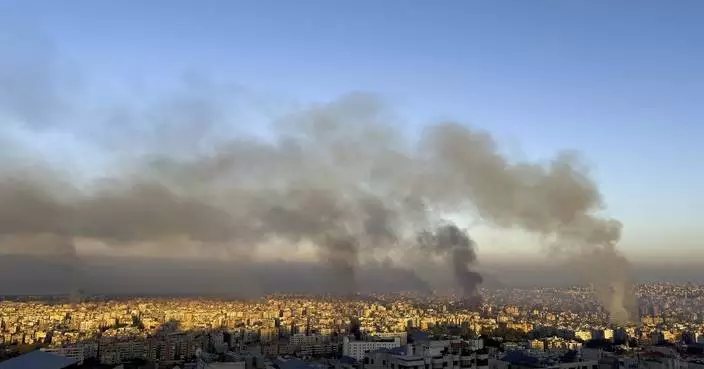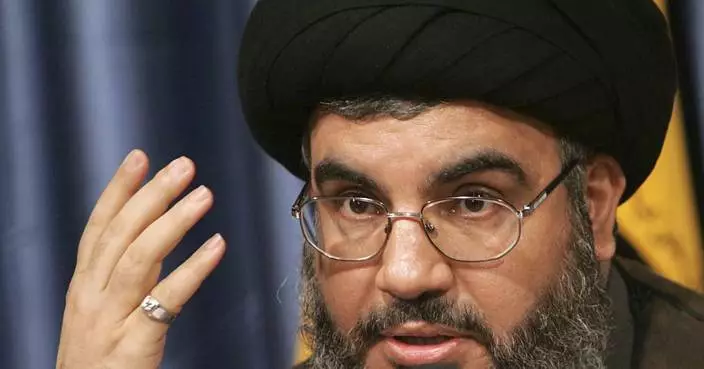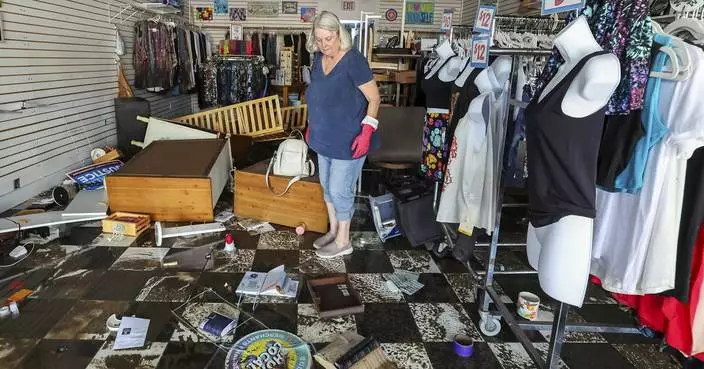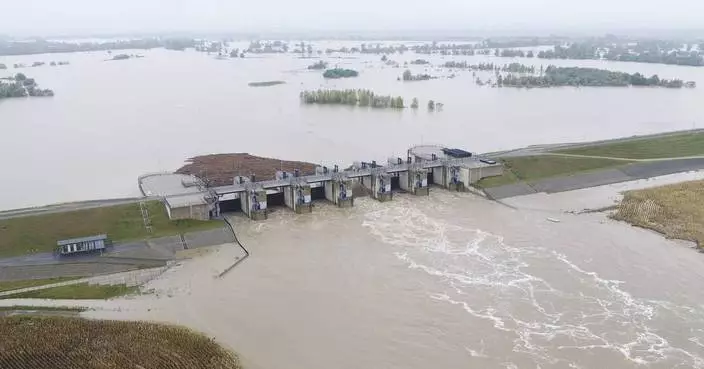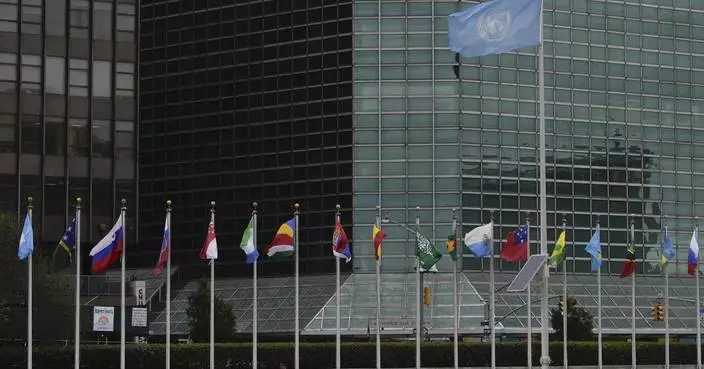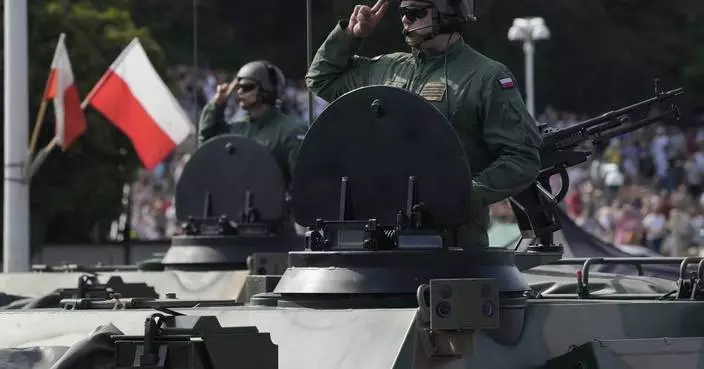HONOLULU (AP) — About two years after 13 children and teens sued Hawaii over the threat posed by climate change, both sides reached a settlement that includes an ambitious requirement to decarbonize the state's transportation system over the next 21 years.
It's another example of a younger generation channeling their frustration with the government's response to the climate crisis into a legal battle.
Navahine v. Hawaii Department of Transportation is the world’s first youth-led constitutional climate case addressing climate pollution from the transportation sector, according to statements from both sides.
The lawsuit said one plaintiff, a 14-year-old Native Hawaiian, was from a family that farmed taro for more than 10 generations. However, extreme droughts and heavy rains caused by climate change have reduced crop yields and threatened her ability to continue the cultural practice.
The complaint said rising sea levels also threaten to put their lands underwater.
Another plaintiff lost her home twice, due to climate change-induced events, according to Our Children's Trust, a public interest law firm that is representing the plaintiffs: flooding from a hurricane in 2018 and last year's deadly wildfire that ravaged Lahaina, on the island of Maui.
Here are some things to know about the historic settlement:
Circuit Court Judge of the First Circuit John M. Tonaki signed a settlement agreement Thursday between the plaintiffs, who are also represented by another law firm, Earthjustice, and the state of Hawaii and its Department of Transportation.
The lawsuit argued that Hawaii was violating the state constitution by operating a transportation system that harms the climate and infringes upon the right to a clean and healthy environment. It accused the Department of Transportation of consistently prioritizing building highways over other types of transportation.
The burning of fossil fuels — oil, gas and coal — is the main contributor to global warming caused by human activity. Hawaii is the state that most depends on petroleum, according to Our Children’s Trust.
A key term of the settlement requires Hawaii to achieve zero greenhouse gas emissions across all transportation modes, including ground transportation and sea and air interisland transportation, “no later than 2045.”
The state must also come up with a greenhouse gas reduction plan within a year.
The transportation department must complete pedestrian, bicycle and transit networks in coordination with Hawaii counties within five years, while dedicating at least $40 million to expanding the public electric vehicle charging network by 2030.
The settlement terms may seem ambitious, but as an isolated island chain the middle of the Pacific, Hawaii is on the “front lines” of climate disasters, Our Children's Trust attorney Andrea Rodgers told the Associated Press on Friday.
“They really have no choice but to step up and address the climate crisis in order to protect their residents and young people who want to live here,” she said.
Also under the settlement, Hawaii will be accountable to a judge who will enforce the agreement if disputes arise.
The lawsuit, filed in June 2022, had been scheduled to go to trial next week. The state is not admitting any liability or wrongdoing by settling.
The parties said the settlement was also the first of its kind between a state government and youth plaintiffs to address constitutional issues arising from climate change.
Rodgers is also involved in similar legal battles in Montana and Oregon, however.
The Montana case prevailed at trial, when a judge ruled last year that state agencies were violating the constitutional right to a clean and healthy environment by allowing fossil fuel development.
Early this year, the state Supreme Court declined a government request to block the ruling pending appeal. Oral arguments before the high court are set for July 10.
In the Oregon case, a federal appeals court panel rejected a long-running lawsuit brought by young climate activists challenging the U.S. government’s role in climate change. The case is still at the 9th U.S. Circuit Court of Appeals.
Overseas, six young adults and children from Portugal are arguing before the European Court of Human Rights that governments across the continent are not doing enough to protect people from climate change.
While Gov. Josh Green, Director of Transportation Ed Sniffen and plaintiffs' attorneys all celebrated the settlement, it was a hard-fought battle.
“The defendants aggressively defended the case,” Rodgers said.
The state spent nearly $3 million on an out-of-state law firm and other costs, including expert witness fees. The attorney general's office said it remained the lead on the case despite help from the outside firm.
The state initially moved to dismiss the lawsuit, arguing that the court “cannot coopt legislative and executive power by issuing an injunction ordering HDOT to create new regulatory programs.”
The state also had to agree that depositions of plaintiffs would be conducted with the sensitivity appropriate for their ages, Rodgers said.
“There was resistance,” Rodgers said of reaching the settlement. “But at the end of the day, Gov. Green and ... Sniffen displayed incredible leadership and made the decision to work with the youth and not against them.”
Implementation over the next 21 years will require both commitment from Hawaii's leaders and involvement by young people, Rodgers said.
There will also have to be a cultural shift in Hawaii, which is car-dependent and has bad traffic.
“I think once people start seeing the investments that are needed to be done into the bike, pedestrian and transit assets, people are really going to start seeing that this is a system that works better for Hawaii and for the community,” Rodgers said.
“Having youth voices a part of this process will be essential,” she added.
Read more of AP’s climate coverage at http://www.apnews.com/climate-and-environment
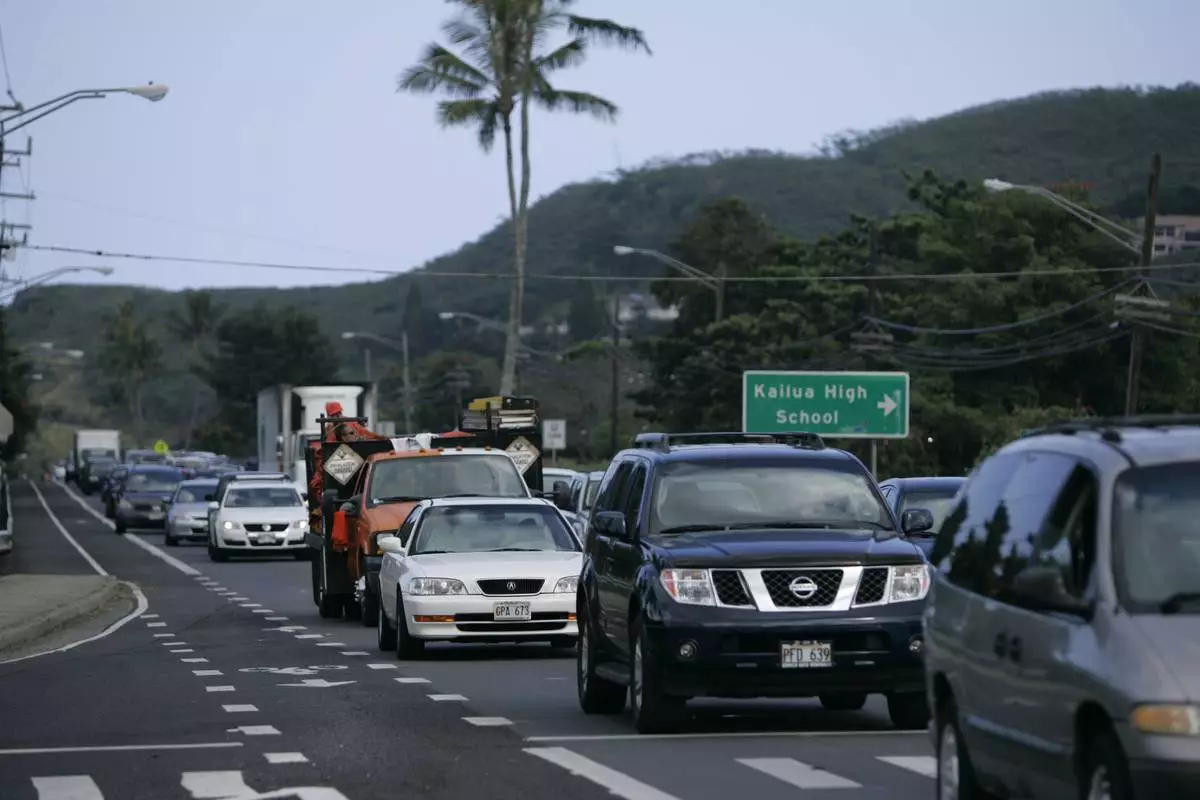
FILE - Heavy traffic is seen Monday, Dec. 28, 2009 in Kailua, Hawaii on the island of Oahu. About two years after 13 children and teens in Hawaii sued the state over the threat posed by climate change, both sides reached a settlement that includes an ambitious requirement to decarbonize Hawaii’s transportation system in the next 21 years. (AP Photo/Marco Garcia, File)
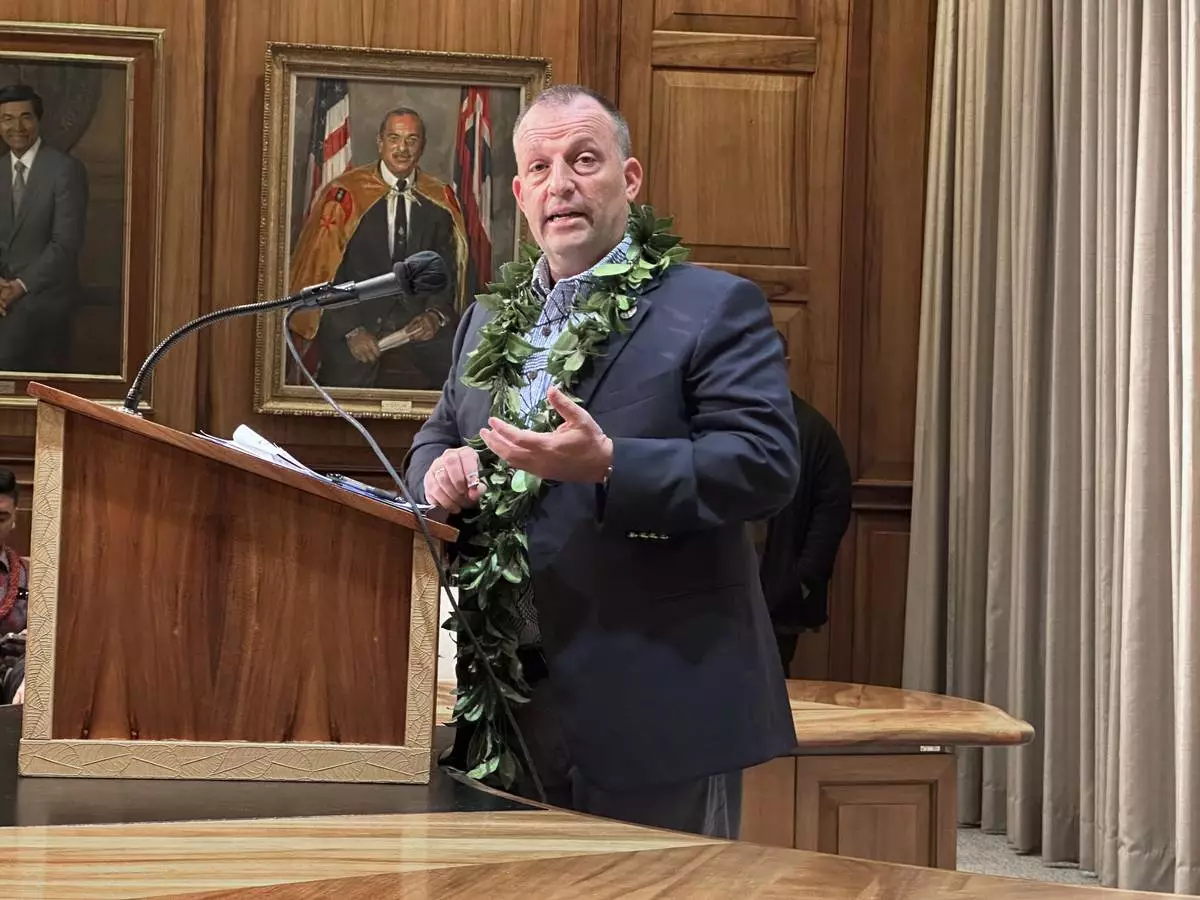
FILE - Hawaii Gov. Josh Green speaks at a news conference in Honolulu on Friday, Dec. 15, 2023. Hawaii's governor and lawyers for youth plaintiffs on Thursday, June 20, 2024, announced they settled a lawsuit alleging Hawaii violated the state constitution by operating a transportation system that harmed the climate and infringed upon the children's right to a clean and healthy environment..(AP Photo/Audrey McAvoy, File)
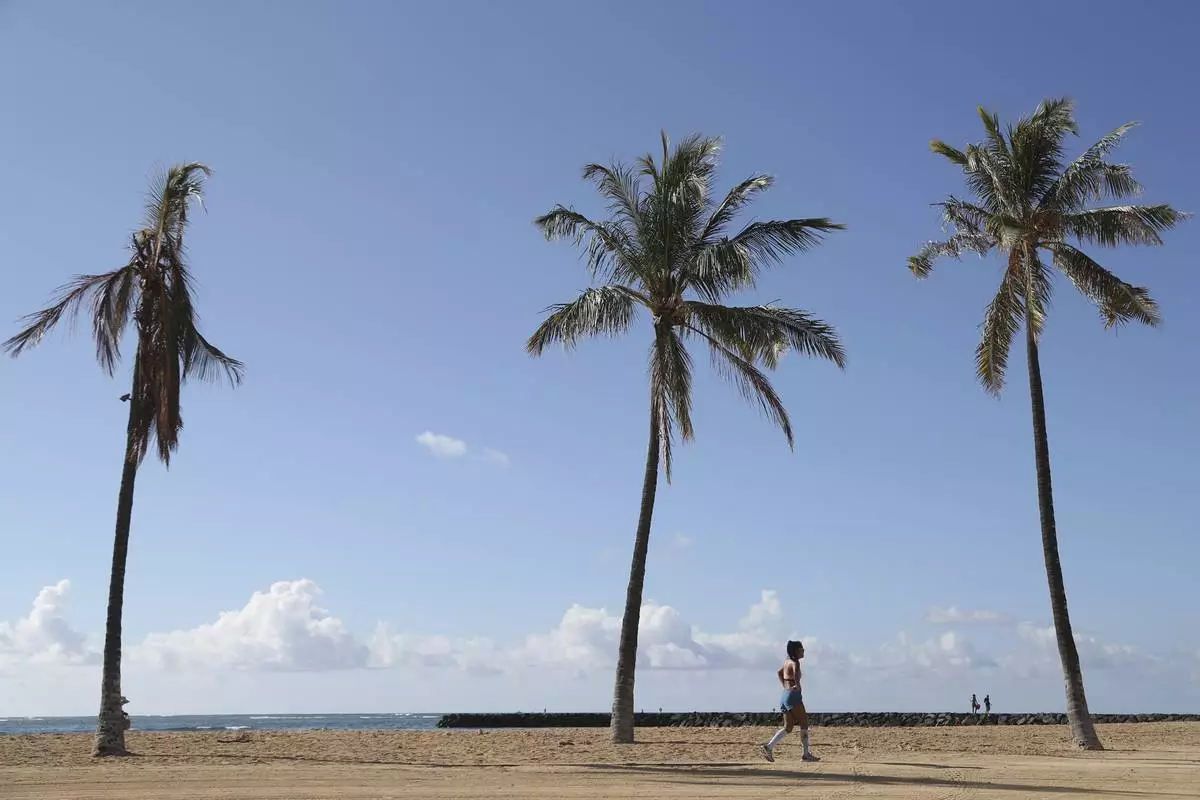
FILE - A beachgoer walks down Waikiki Beach, Thursday, Oct. 15, 2020, in Honolulu. About two years after 13 children and teens in Hawaii sued the state over the threat posed by climate change, both sides reached a settlement that includes an ambitious requirement to decarbonize Hawaii’s transportation system in the next 21 years. (AP Photo/Marco Garcia, File)
BEIRUT (AP) — Iran announced Saturday that a prominent general in its paramilitary Revolutionary Guard sanctioned by the U.S. died in an airstrike that killed Hezbollah leader Hassan Nasrallah in Beirut.
Abbas Nilforushan, 58, was killed Friday in Lebanon, Iran’s state-run IRNA news agency reported.
The U.S. Treasury had identified Nilforushan as the deputy commander for operations in the Guard. It sanctioned him in 2022 and said he had led an organization “directly in charge of protest suppression, which has played a critical role in arresting protest leaders during previous protests.” Those sanctions came amid the monthslong protests over the death of Mahsa Amini after her arrest for allegedly not wearing her headscarf, or hijab, to the liking of police.
Nilforushan also served in Syria backing President Bashar Assad in his country’s decades-long war that grew out of the 2011 Arab Spring that swept the wider Middle East. He served in the Iran-Iraq war of the 1980s like many of his colleagues.
In 2020, Iranian state television called him “comrade” of Gen. Qassem Soleimani, the head of its expeditionary Quds Force who was killed in 2020 U.S. drone attack in Baghdad. In 2021, Nilforushan told state TV that Israel was not in a capacity to pose a threat against Iran over what he described as Israel’s weakness.
THIS IS A BREAKING NEWS UPDATE. AP’s earlier story follows below.
BEIRUT (AP) — Lebanon’s Hezbollah group confirmed on Saturday that its leader and one of its founders, Hassan Nasrallah, was killed in an Israeli airstrike in Beirut the previous day.
A statement said Nasrallah “has joined his fellow martyrs.” Hezbollah vowed to “continue the holy war against the enemy and in support of Palestine.”
Nasrallah, who led Hezbollah for more than three decades, is by far the most powerful target to be killed by Israel in weeks of intensified fighting with Hezbollah. The Israeli military said it carried out a precise airstrike on Friday while Hezbollah leadership were meeting at their headquarters in Dahiyeh, south of Beirut.
The Lebanese Health Ministry said six people were killed and 91 injured in the strikes, which leveled six apartment buildings. Ali Karki, the commander of Hezbollah’s Southern Front and other commanders were also killed, the Israeli military said.
Lt. Col. Nadav Shoshani, an army spokesperson, said the airstrike was based on years of tracking Nasrallah along with “real time information” that made it viable. He declined to say what munitions were used in the strike or provide an estimate on civilian deaths, only saying that Israel takes measures to avoid civilians whenever possible and clears strikes ahead of time with intelligence and legal experts.
The Palestinian militant group Hamas in a statement issued condolences to its ally, Hezbollah. Nasrallah frequently described launching rockets against northern Israel as a “support front” for Hamas and Palestinians in Gaza.
“History has proven that the resistance ... whenever its leaders die as martyrs, will be succeeded on the same path by a generation of leaders who are more valiant, stronger and more determined to continue the confrontation,” the Hamas statement said.
It added that “assassinations will only increase the resistance in Lebanon and Palestine in determination and resolve.”
Immediately after the official confirmation from Hezbollah, people starting firing in the air in Beirut and other areas of the country, to mourn Nasrallah's death. Some were protesting that he was killed because of his support for the war in Gaza. “Wish it was our kids, not you, Sayyid!” said one woman, using an honorific title for Nasrallah, as she clutched her baby in the western city of Baabda.
Israel’s Chief of Staff, Lt. Gen. Herzi Halevi, said Saturday that the elimination of Nasrallah was “not the end of our toolbox,” indicating that more strikes were planned.
Israel has vowed to step up pressure on Hezbollah until it halts its attacks that have displaced tens of thousands of Israelis from communities near the Lebanese border. The recent fighting has also displaced more than 200,000 Lebanese in the past week, according to the United Nations.
The military said Saturday it was mobilizing additional reserve soldiers as tensions escalate with Lebanon, activating three battalions of reserve soldiers to serve across the country. It sent two brigades to northern Israel earlier in the week to train for a possible ground invasion.
Shoshani, the army spokesperson, said that Israel has inflicted heavy damage on Hezbollah’s capabilities over the past week by targeting a combination of immediate threats and strategic weapons, such as larger, guided missiles. But he said much of Hezbollah’s arsenal still remains intact and that Israel would continue to target the group. The Israeli military updated guidelines for Israeli citizens, canceling gatherings of more than 1,000 people due to the ongoing threat.
Approximately 60,000 Israelis have been evacuated from their homes along the Lebanese border for almost a year. Earlier this month, Israel's government said halting Hezbollah’s attacks in the country’s north to allow residents to return to their homes is an official war goal.
Iranian state television read the announcement from Hezbollah confirming Nasrallah's death live, but there was no other immediate comment. Iranian Supreme Leader Ayatollah Ali Khamenei in a Saturday message said "the resistance movement, heading by Hezbollah, will decide the fate of the region,” in a statement read on state TV.
Iran is the main supporter of Lebanese Hezbollah and other militant groups in the region.
Also on Saturday, Iran’s influential parliamentary committee of national security demanded “strong” response to Israel following a meeting of the committee. State TV also said people staged anti-Israeli rallies in support of Hezbollah in major cities and town across the country.
Iraqi Prime Minister Mohammed Shia al-Sudani of declared a three-day period of mourning in his country. Sudani came to power with the backing of a coalition of Iran-backed political factions, many of which have armed wings that are allied with Hezbollah.
Hezbollah started firing rockets on Israel in support of Gaza on Oct. 8, a day after Hamas militants launched an unprecedented attack on Israel, killing some 1,200 people and abducting another 250. Since then, the two sides have been engaged in cross-border strikes that have gradually escalated and displaced tens of thousands of civilians on both sides of the border.
Hostilities escalated dramatically last week when thousands of explosives hidden in pagers and walkie-talkies used by Hezbollah detonated, killing dozens of people and leaving thousands, including many civilians, with severe injuries to the eyes, face and limbs. Israel is widely believed to be behind the attack. Israel has also killed several top Hezbollah commanders in Beirut, especially in the past two weeks, in addition to the attack that killed Nasrallah.
Orna Mizrahi, a senior researcher at the Tel Aviv-based think tank Institute for National Security Studies and former intelligence analyst for the Israeli military and prime minister’s office, noted that Nasrallah was sometimes a “voice of reason,” interested in engaging Israel in a war of attrition and holding the militant group back from using the full force of their formidable arsenal against Israel.
Nasrallah's death could prompt some less senior members of Hezbollah to unleash much stronger weapons than have been used in the nearly yearlong exchange of hostilities between Hezbollah and Lebanon, she said. The biggest question mark right now, though, is how Iran will respond, said Mizrahi.
She added that Nasrallah's death could provide a window of opportunity, while the organization is significantly weakened, for Lebanon to dilute Hezbollah’s far-reaching influence, especially in the south, that threatens to drag Lebanon into a full-scale war with Israel.
On Saturday morning, the Israeli military carried out more than 140 airstrikes in southern Beirut and eastern Lebanon’s Bekaa Valley, including targeting a storage facility for anti-ship missiles in Beirut suburb of Dahiyeh. Israel said the missiles were stored underground beneath civilian apartment buildings. Hezbollah launched dozens of projectiles across northern and central Israel and deep into the Israel-occupied West Bank, damaging some buildings in the northern town of Safed.
In Beirut’s southern suburbs, smoke rose and the streets were empty after the area was pummeled overnight by heavy Israeli airstrikes. Shelters set up in the city center for displaced people were overflowing. Many families slept in public squares and beaches or in their cars. On the roads leading to the mountains above the capital, hundreds of people could be seen making an exodus on foot, holding infants and whatever belongings they could carry.
At least 720 people have been killed in Lebanon over the past week by Israeli airstrikes, according to the Health Ministry.
Mroue reported from Beirut. Abby Sewell in Beirut; Lujain Jo in Baabda, Lebanon; Nasser Karimi in Tehran; and Jon Gambrell in Dubai, United Arab Emirates, contributed.
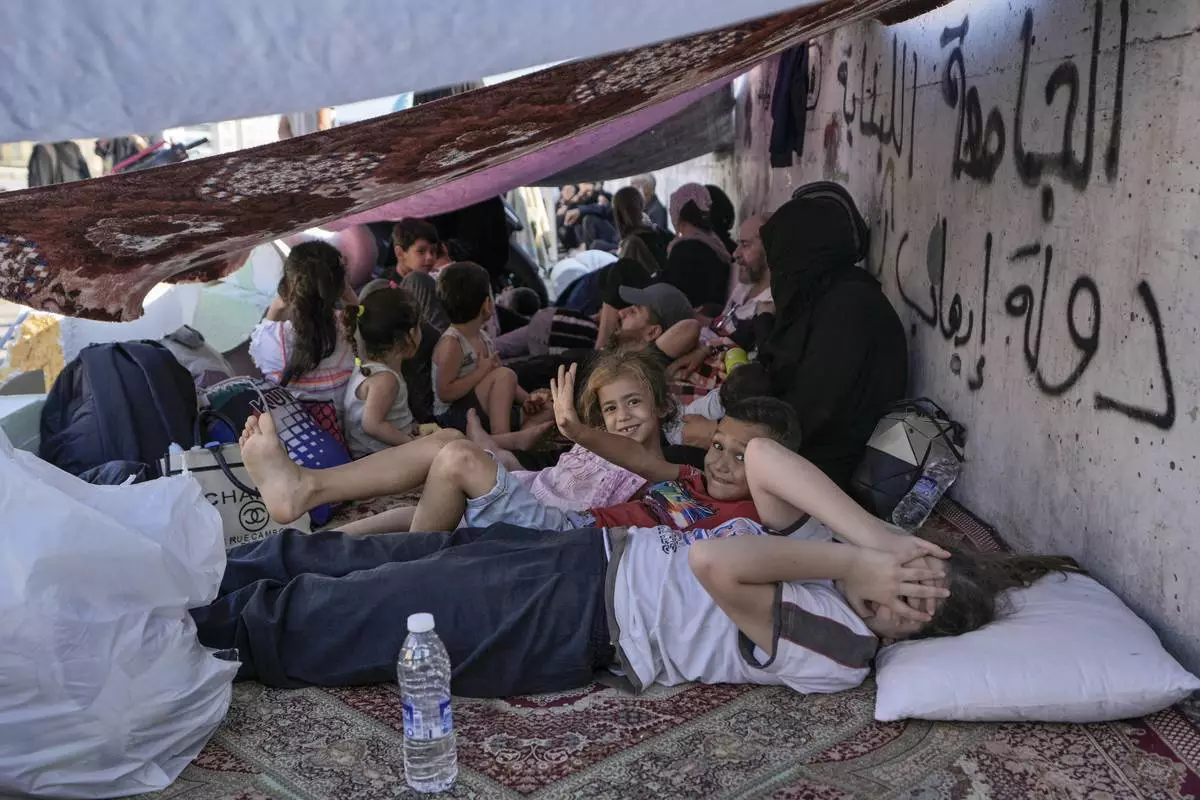
Children with their families lie on the ground in Beirut's Martyrs' square after fleeing the Israeli airstrikes in Beirut's southern suburbs, Saturday, Sept. 28, 2024. (AP Photo/Bilal Hussein)
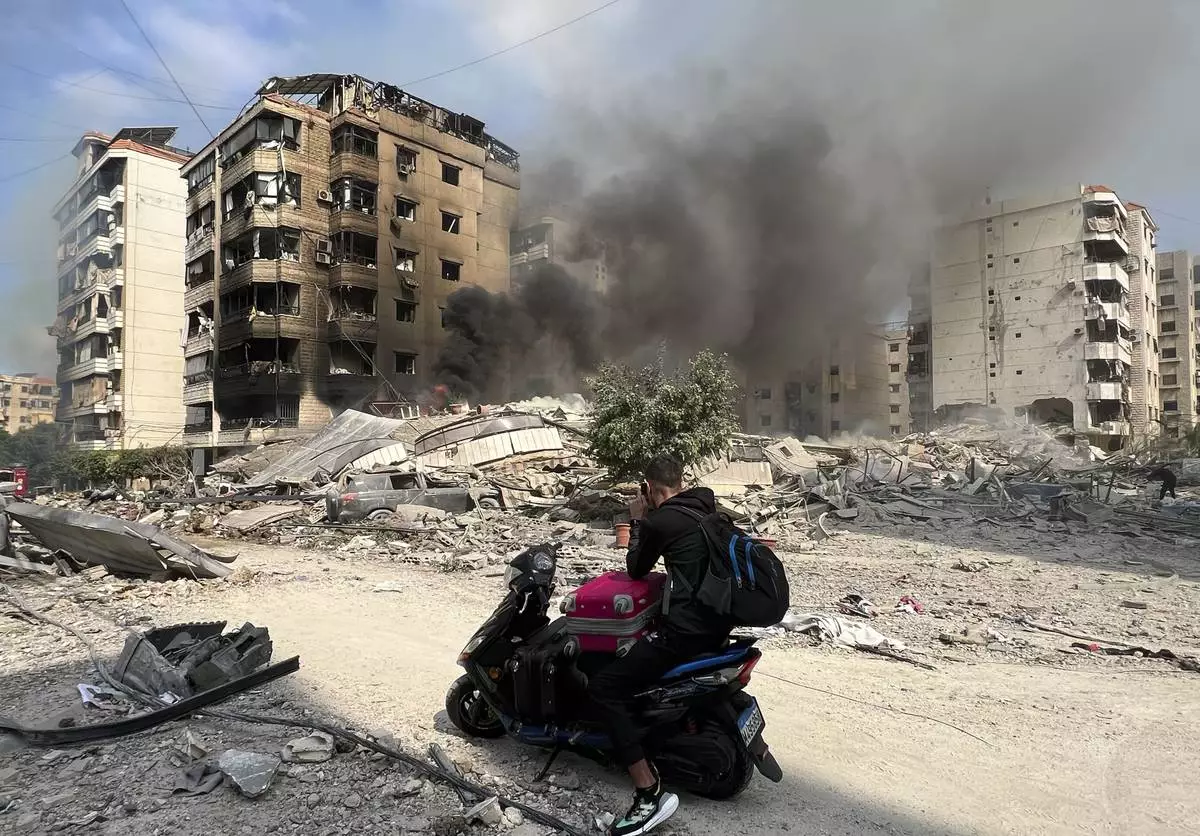
Smoke rises at the site of Israeli airstrikes in Beirut's southern suburbs, Saturday, Sept. 28, 2024. (AP Photo/Hussein Malla)
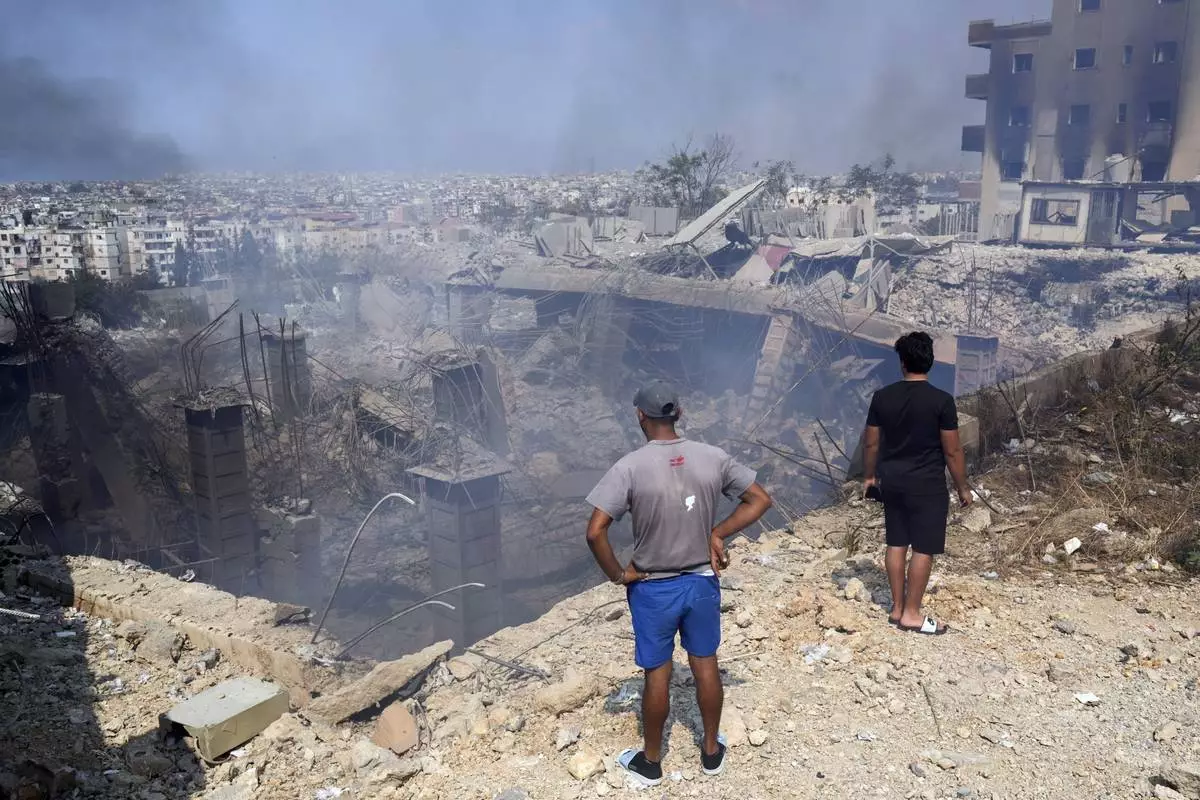
People check a damaged building at the site of an Israeli airstrike in Choueifat, south east of Beirut, Saturday, Sept. 28, 2024. (AP Photo/Hussein Malla)
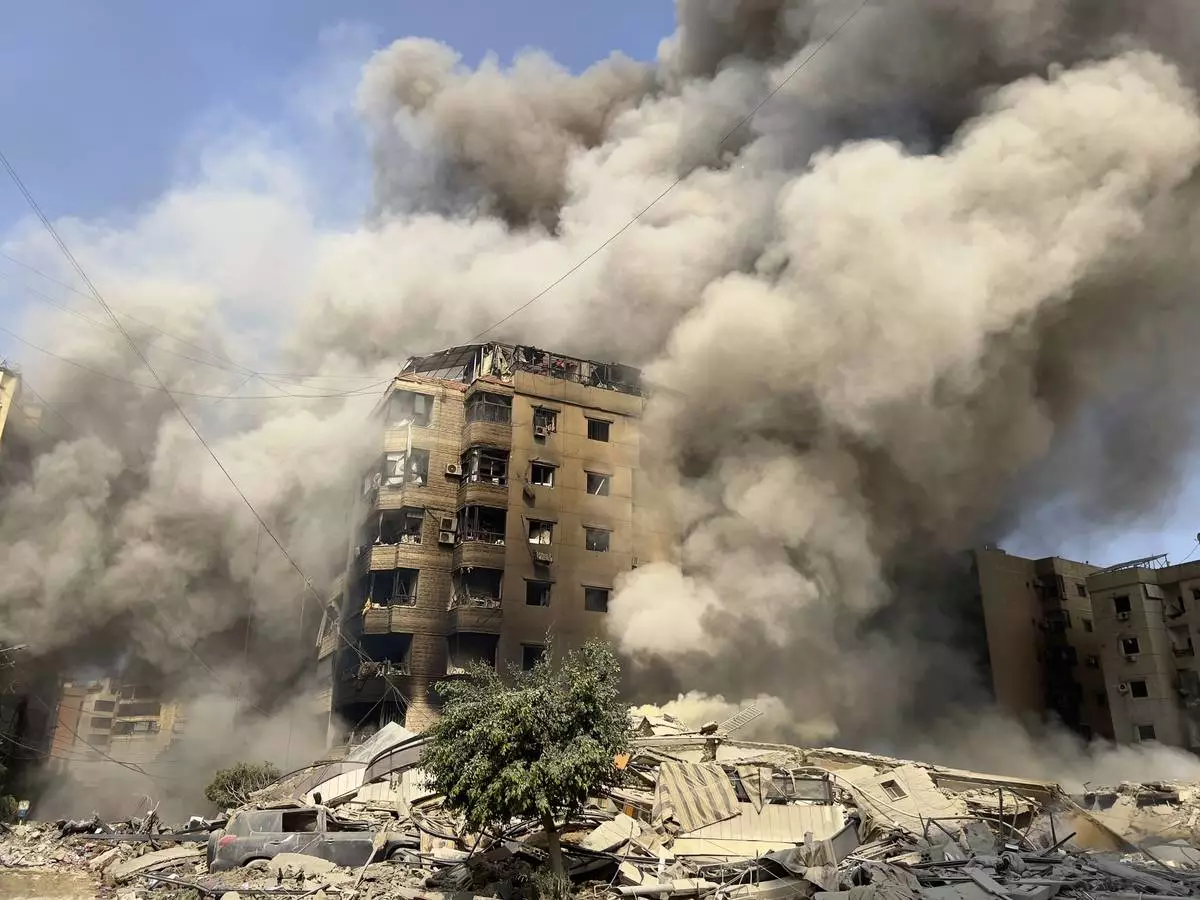
Smoke rises as a building collapses in Beirut's southern suburbs, Saturday, Sept. 28, 2024. (AP Photo/Hussein Malla)
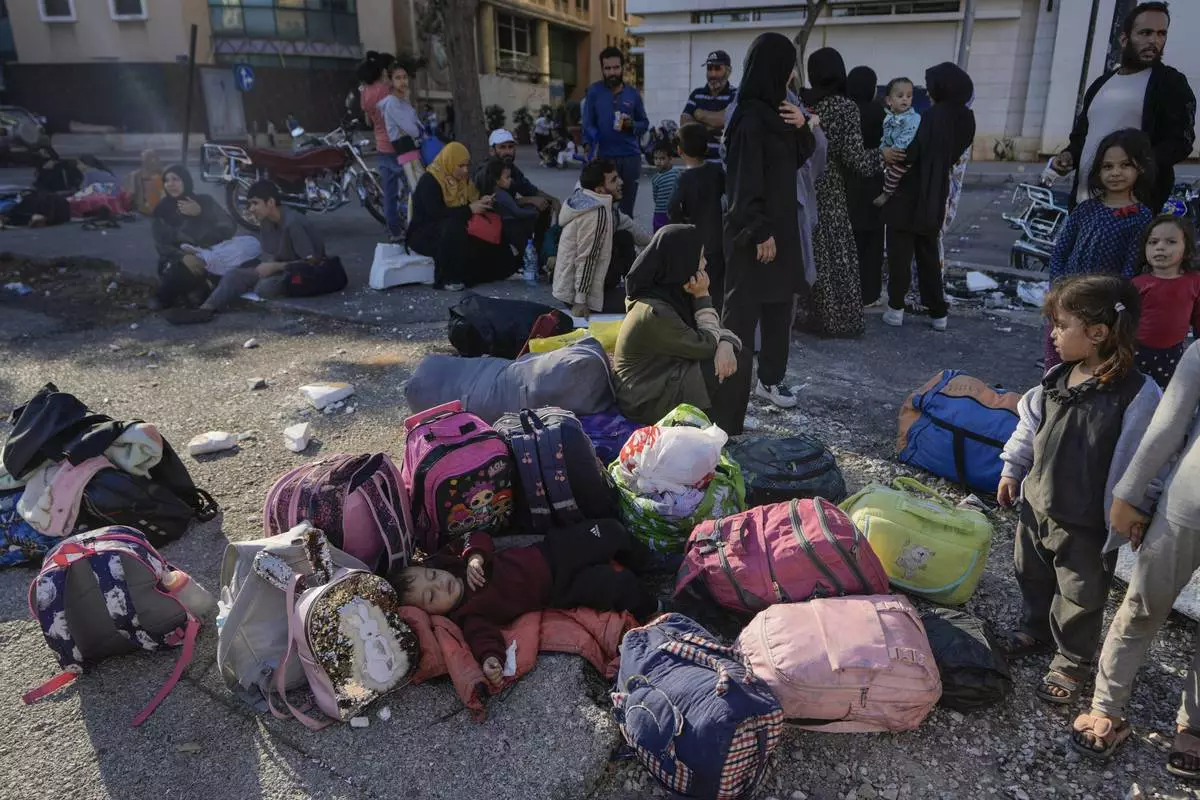
Families gather in Martyrs' square after fleeing the Israeli airstrikes in Beirut's southern suburbs, Saturday, Sept. 28, 2024. (AP Photo/Bilal Hussein)
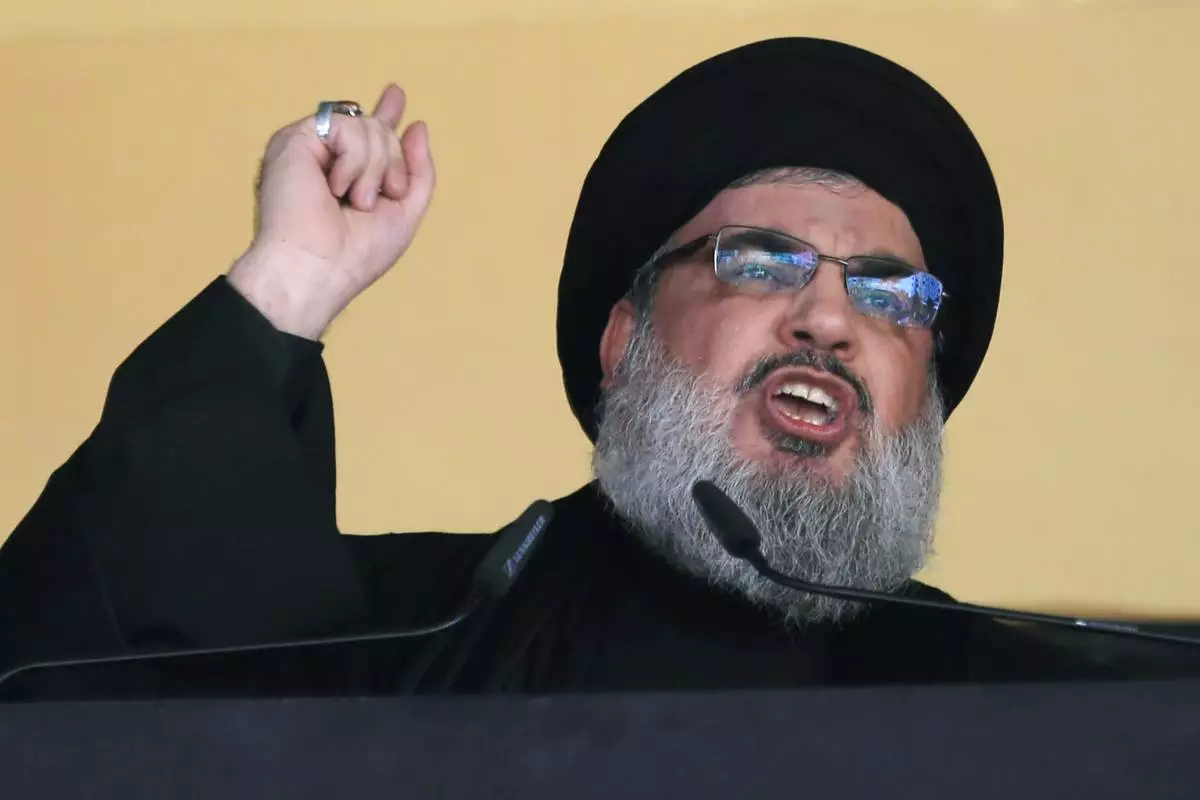
FILE - In this Oct. 24, 2015 file photo, Hezbollah leader Sheik Hassan Nasrallah addresses a crowd during the holy day of Ashoura, in a southern suburb of Beirut, Lebanon. (AP Photo/Hassan Ammar, File)
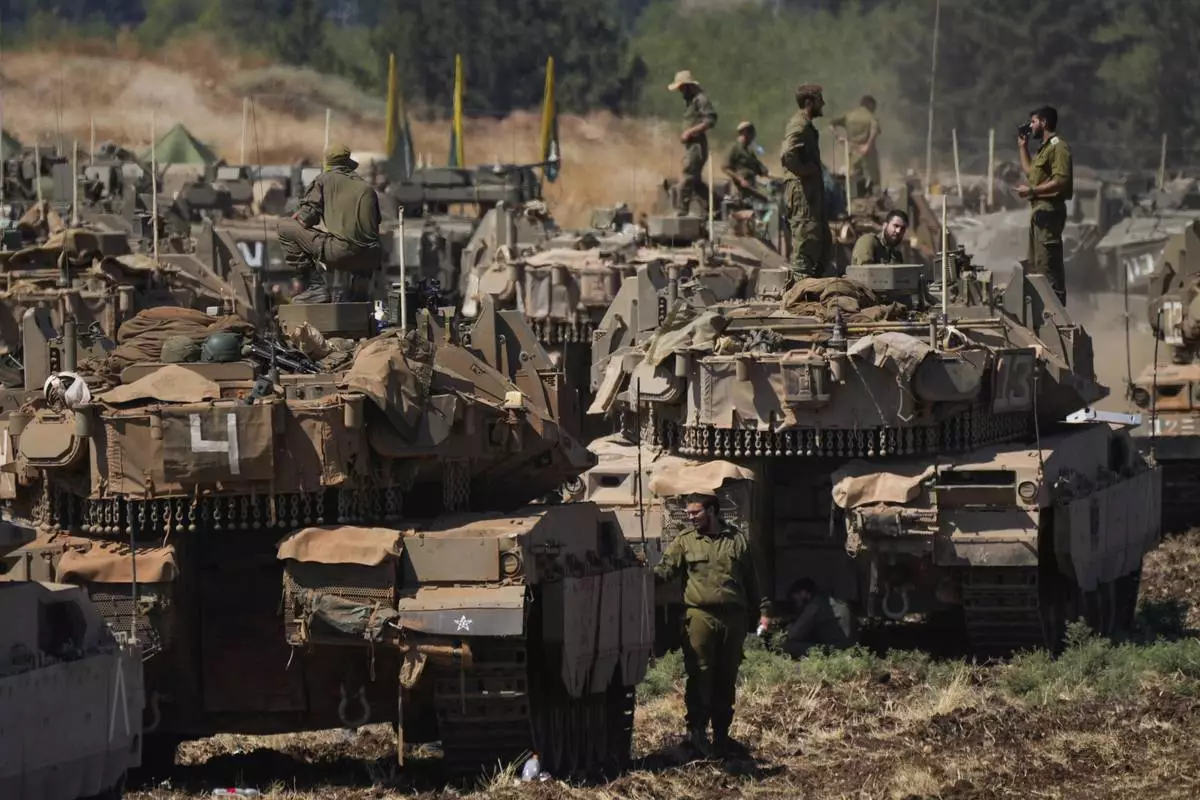
Israeli soldiers work on tanks in northern Israel on Friday, Sept. 27, 2024. (AP Photo/Baz Ratner)
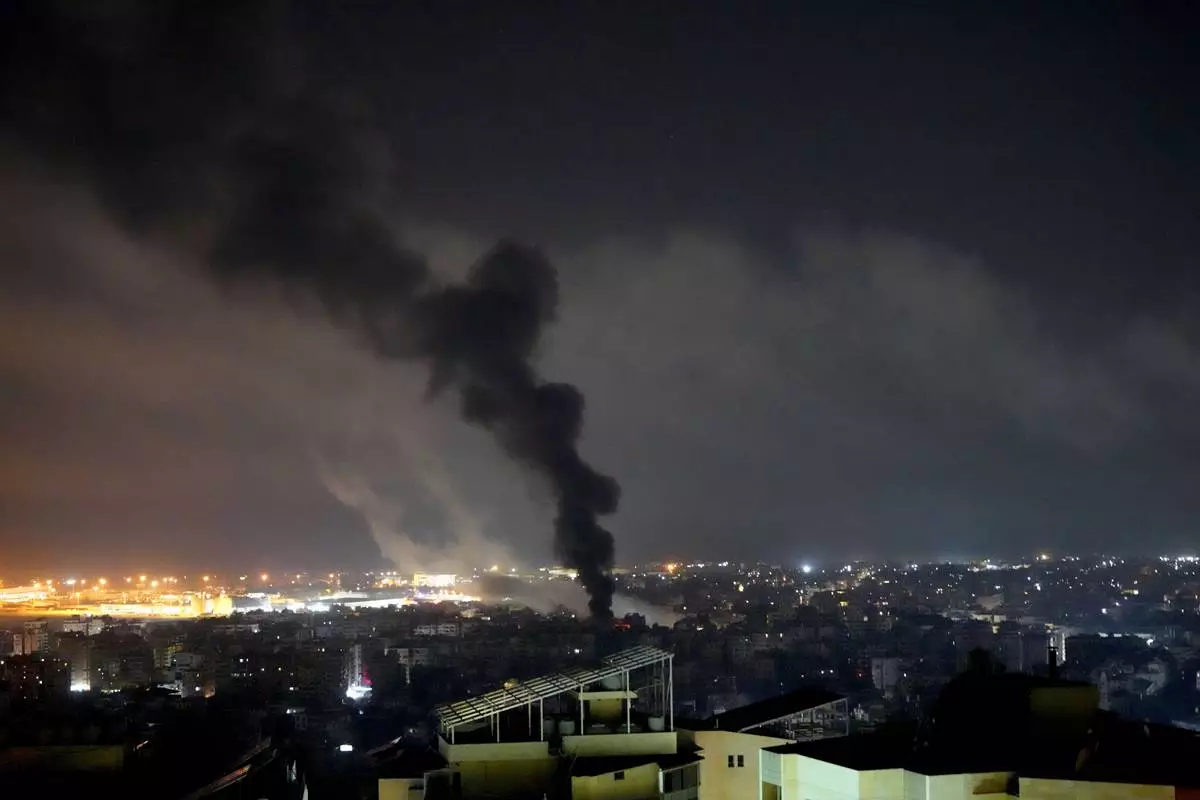
Smoke rises from Israeli airstrikes in Beirut's southern suburbs, Lebanon, Saturday, Sept. 28, 2024. (AP Photo/Hassan Ammar)
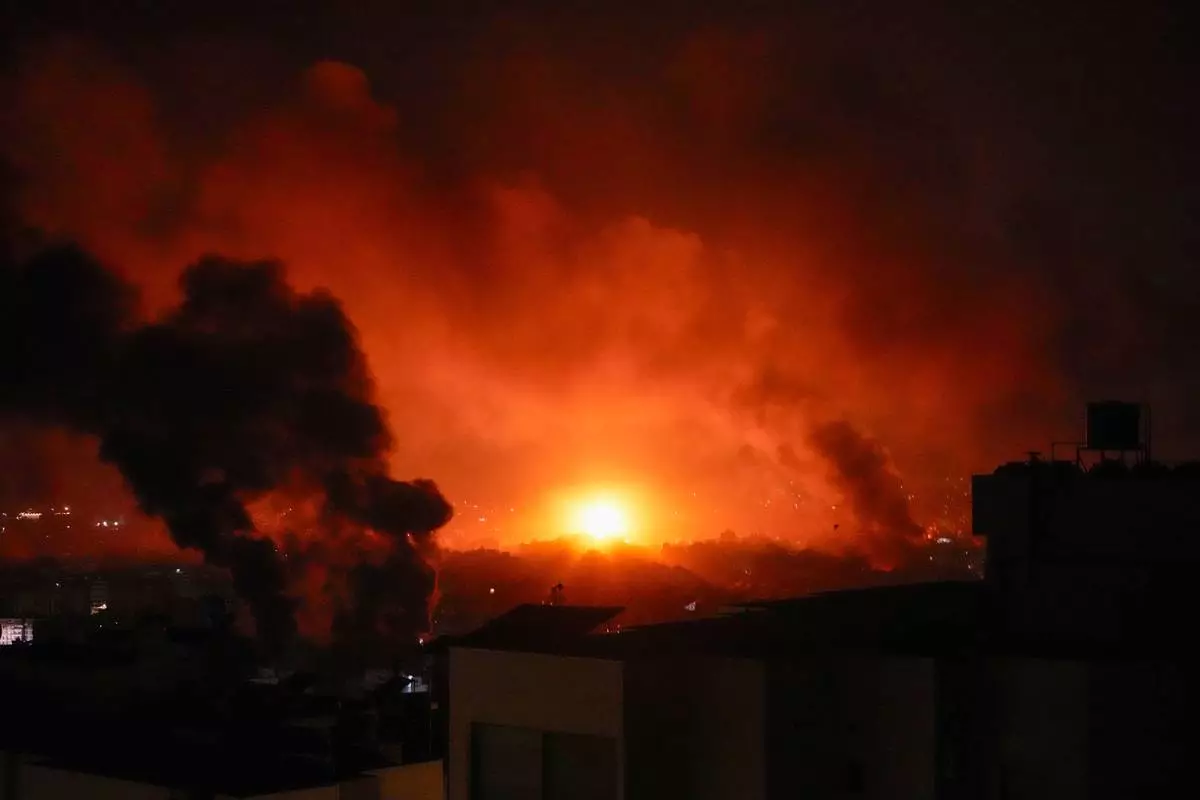
Smoke and fire rise following an Israeli airstrikes in Beirut's southern suburbs, Lebanon, Saturday, Sept. 28, 2024. (AP Photo/Hassan Ammar)
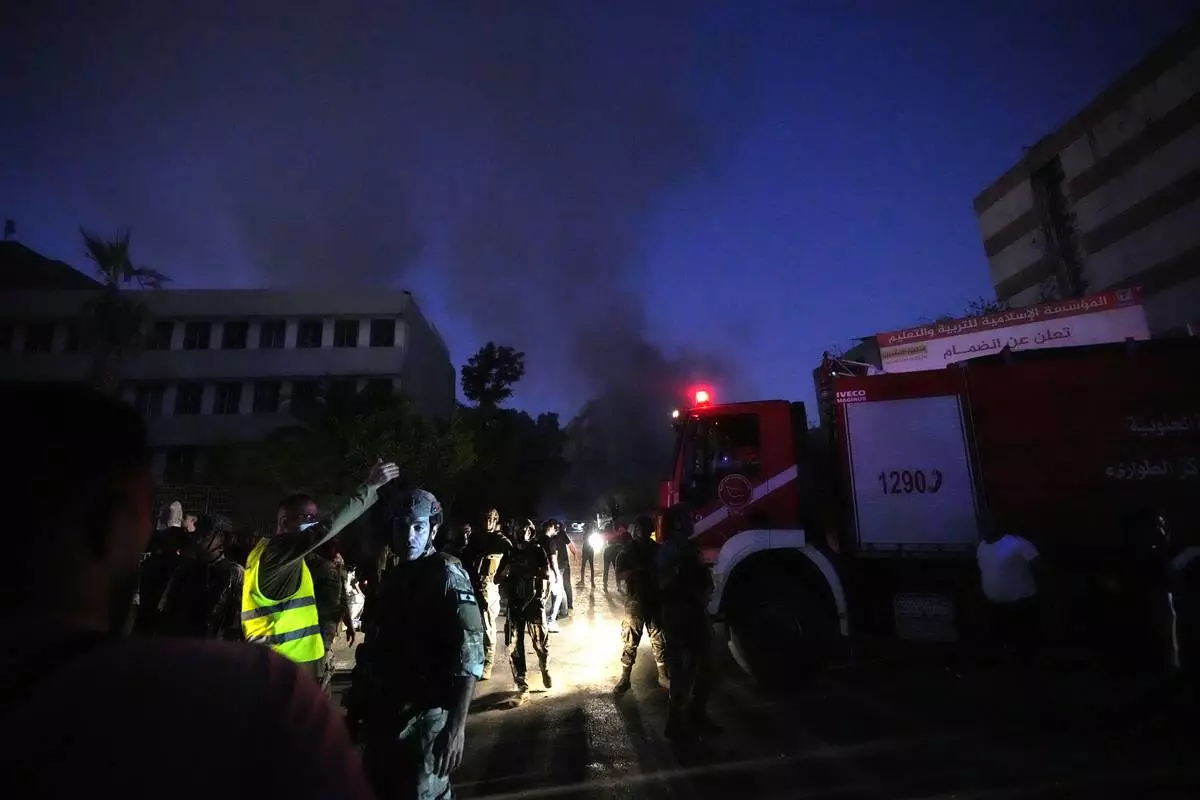
Rescuers arrive near the site of an Israeli airstrike in Beirut's southern suburbs, Friday, Sept. 27, 2024. (AP Photo/Hassan Ammar)
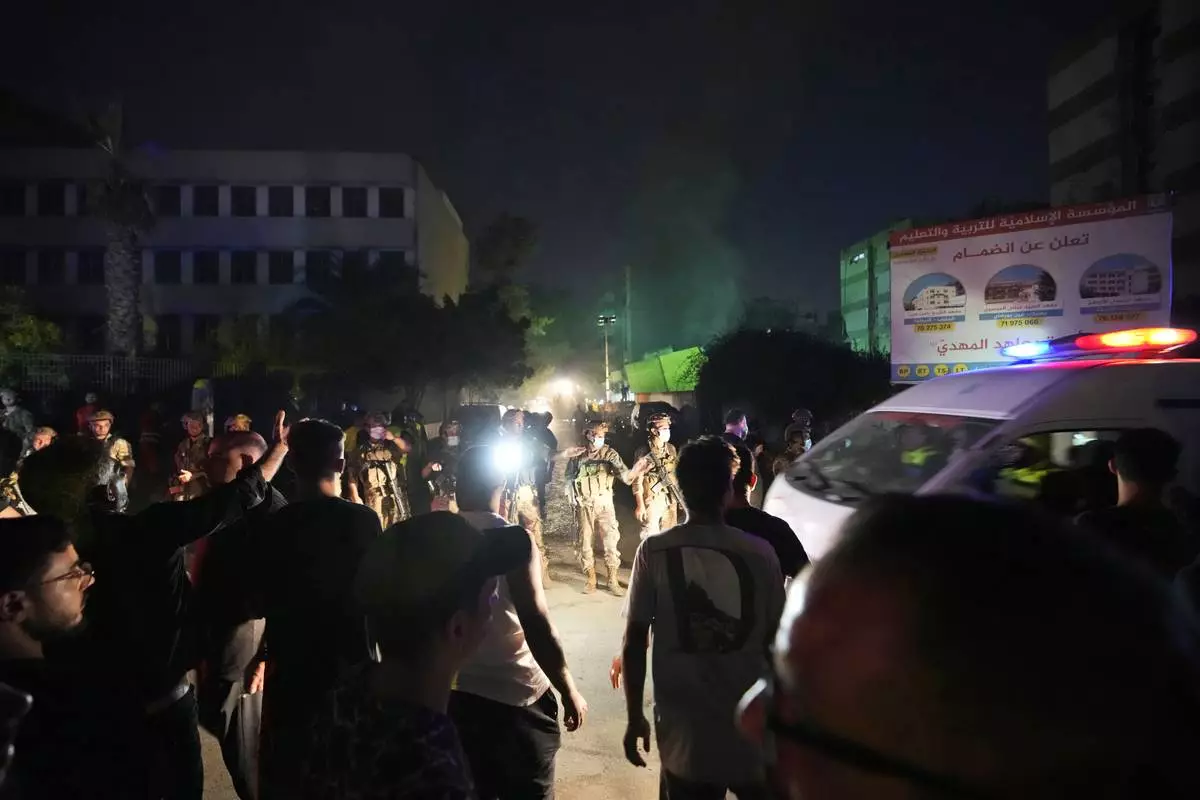
Rescuers arrive near the site of an Israeli airstrike in Beirut's southern suburbs, Friday, Sept. 27, 2024. (AP Photo/Hassan Ammar)
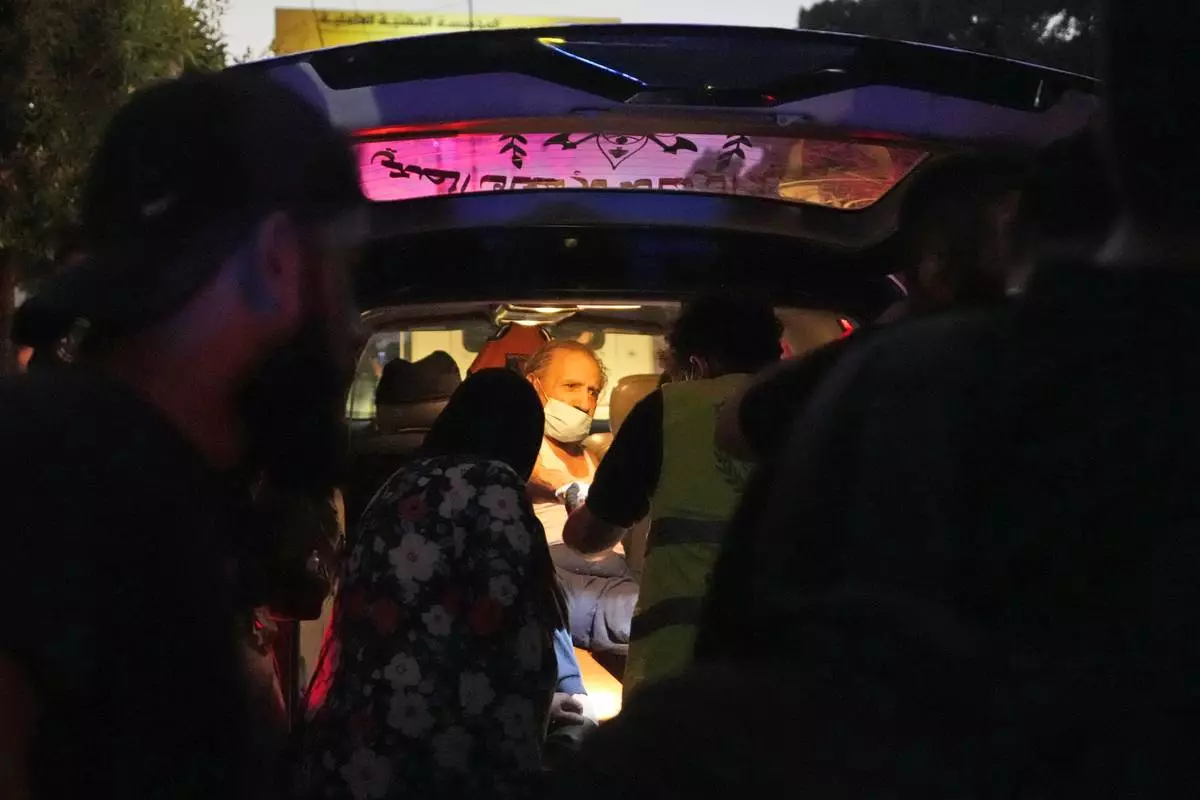
A wounded man sits in an ambulance at the site of an Israeli airstrike in Beirut's southern suburbs, Friday, Sept. 27, 2024. (AP Photo/Hassan Ammar)
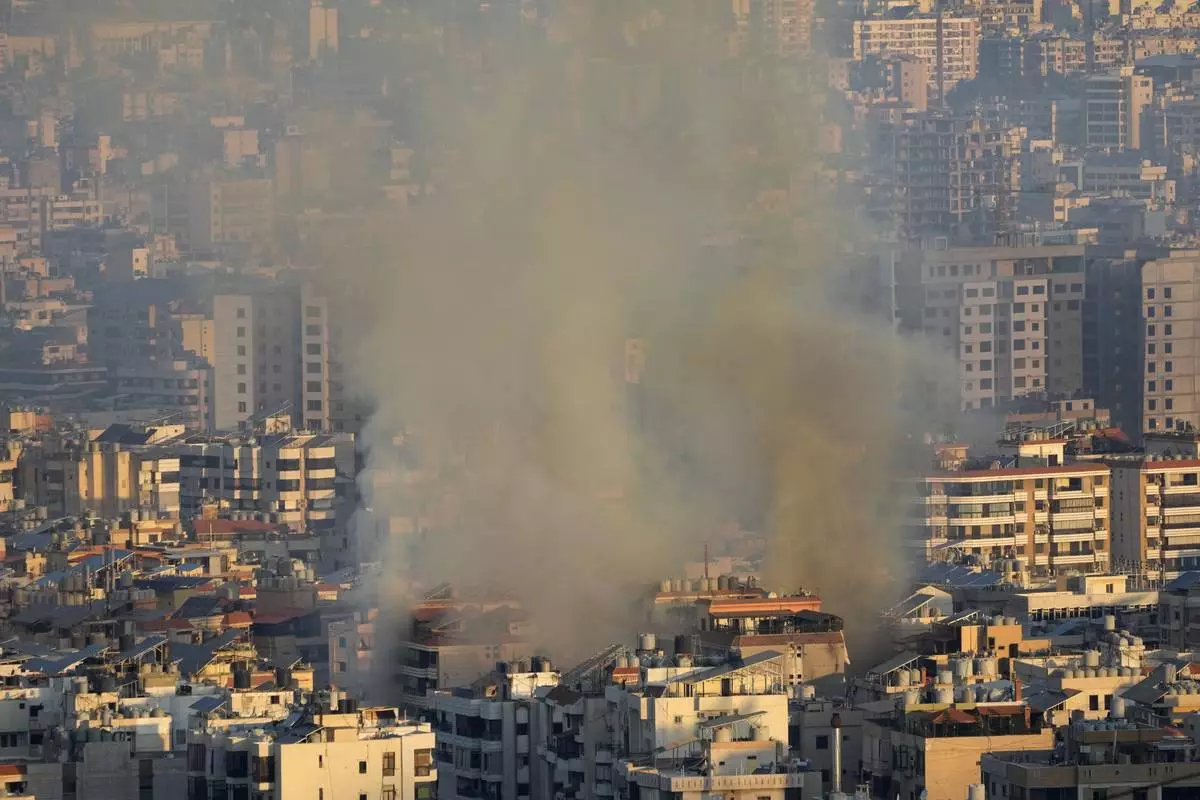
Smoke rises from an Israeli airstrike in the southern suburbs of Beirut, Lebanon, Saturday, Sept. 28, 2024. (AP Photo/Hussein Malla)
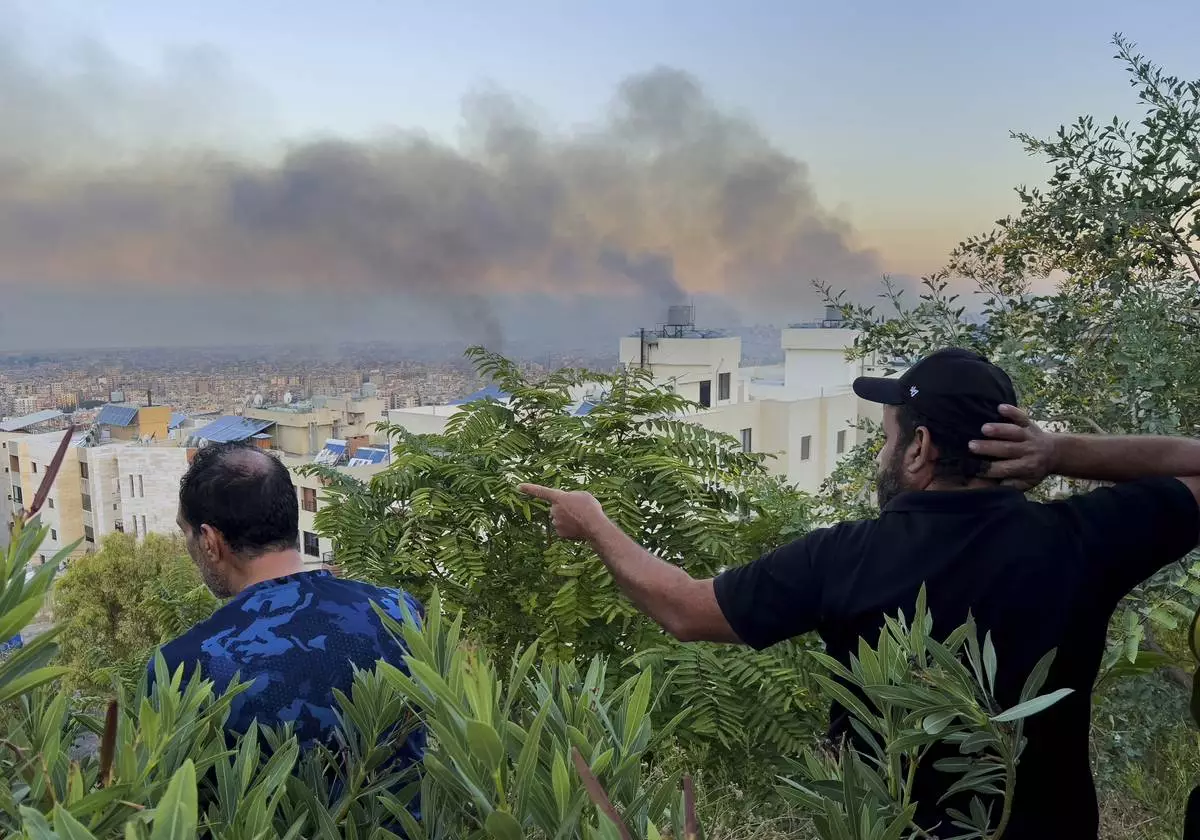
Lebanese citizens watch smoke rise from Israeli airstrikes in the southern suburbs of Beirut, Lebanon, Saturday, Sept. 28, 2024. (AP Photo/Hussein Malla)
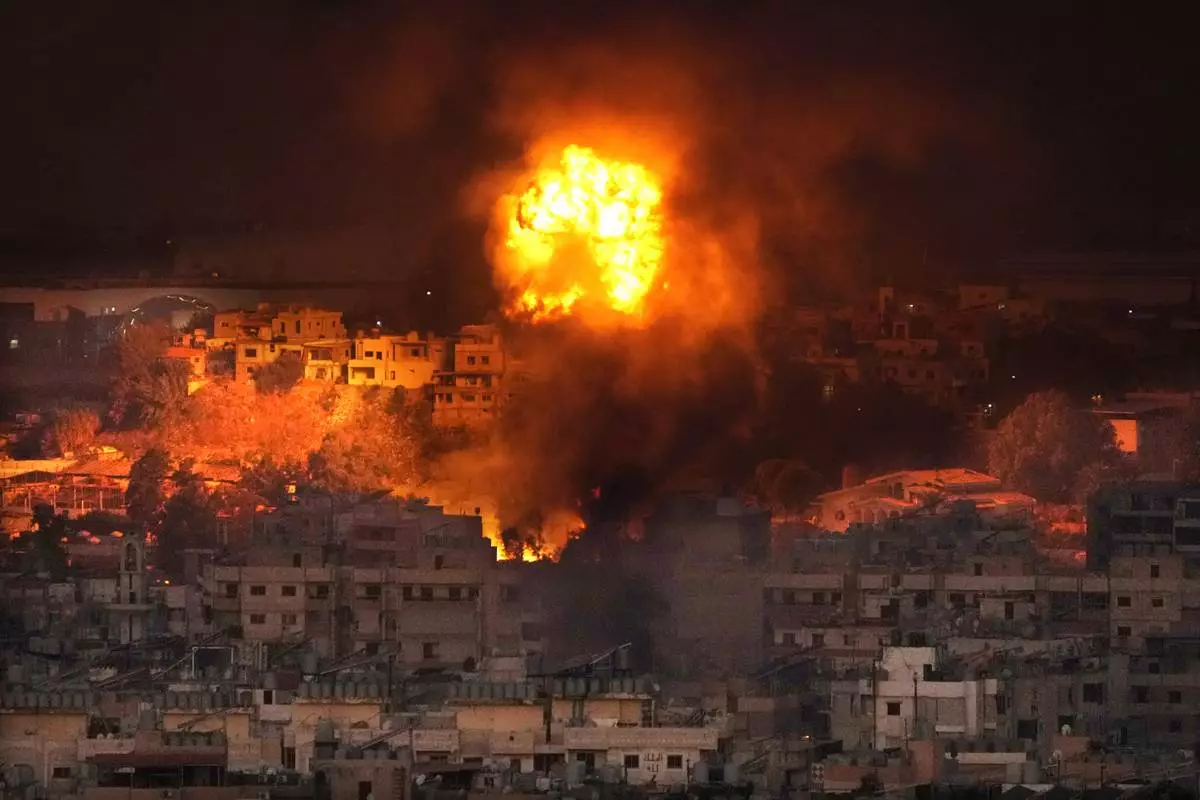
Flames rise after an Israeli airstrike in the southern suburbs of Beirut, Lebanon, Saturday, Sept. 28, 2024. (AP Photo/Hussein Malla)
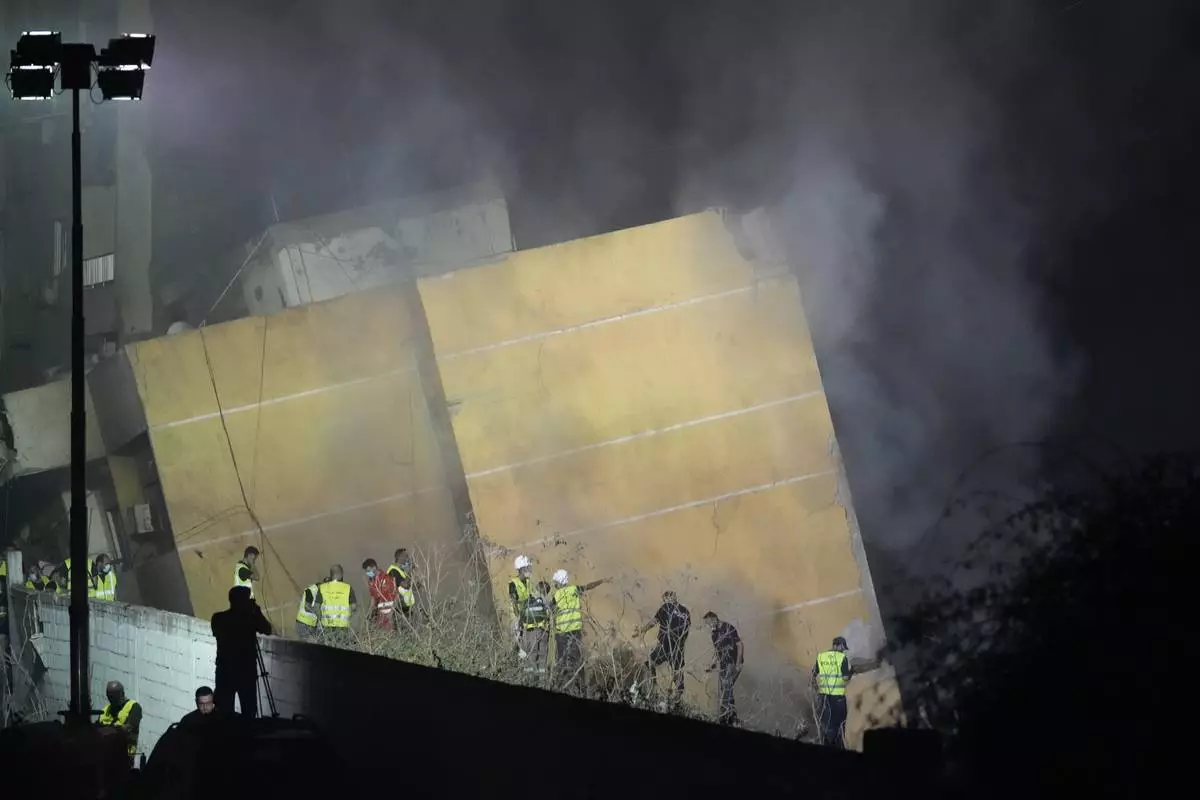
Rescuers gather as smoke rises from a collapsed building at the site of an Israeli airstrike in Beirut's southern suburbs, Friday, Sept. 27, 2024. (AP Photo/Hassan Ammar)
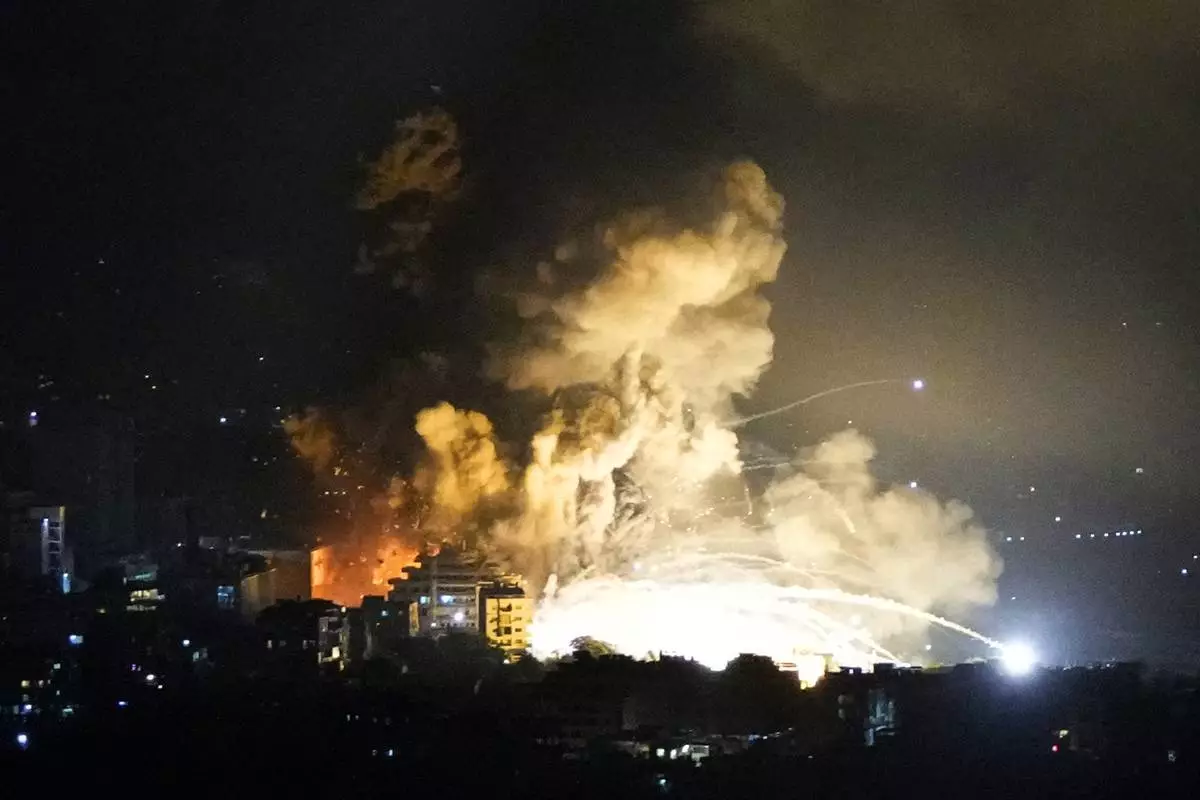
Smoke rises from Israeli airstrikes in Beirut's southern suburbs, Lebanon, Saturday, Sept. 28, 2024. (AP Photo/Hassan Ammar)
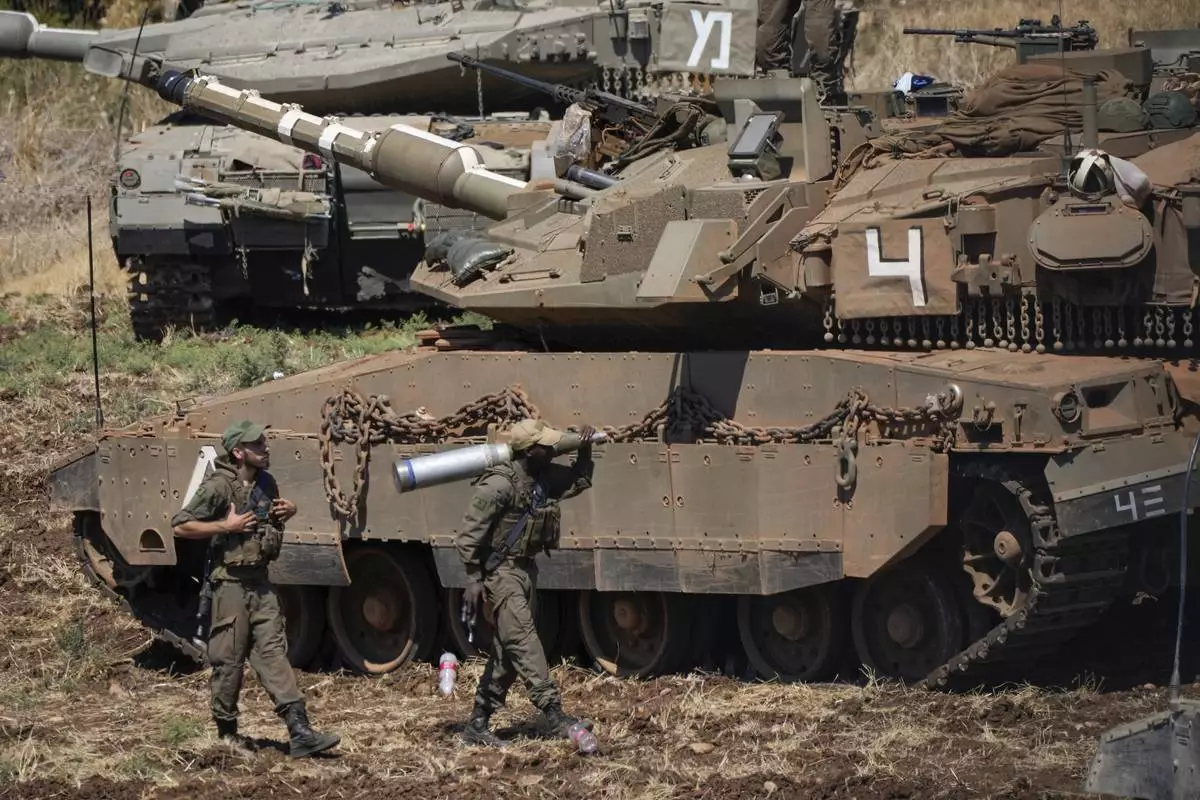
An Israeli soldier carries a shell next to a tank in northern Israel on Friday, Sept. 27, 2024. (AP Photo/Baz Ratner)





